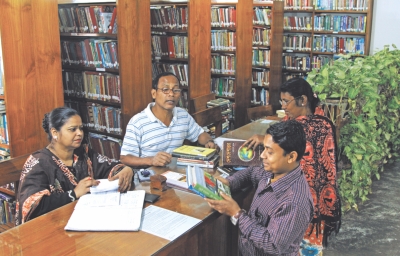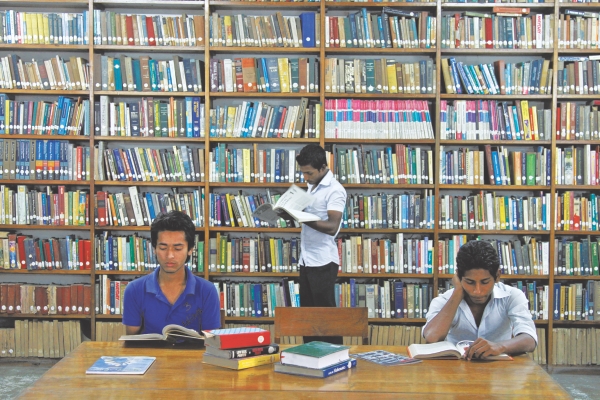| Home - Back Issues - The Team - Contact Us |
 |
| Volume 11 |Issue 06| February 10, 2012 | |
|
|
Endeavour A Neighbourhood Library Turns 48 Akram Hosen Mamun
It all began with the casual gathering of some young men who used to spend afternoons at leisure in Narayanganj in the early 60s. They talked about literature, culture, politics and economics. But most of all, they felt an urge to do something meaningful with their time. Since all of them were avid readers, they decided to establish a library in the neighbourhood. In 1964, they set up a library in a tiny rented room adjacent to a furniture shop. It had 10 books, a shelf, a table, some chairs and a couple of hurricane lamps. In time, that library was named Sudhijan Pathagar, and became renowned for its splendid collection of books. Judged in term of the quality of services provided to its readers, Sudhijan Pathagar is undoubtedly one of the greatest libraries in the country at present. In 1987, it moved to its own imposing building at Chashara, at the heart of the city of Narayanganj. The collection is also fairly large: nearly 40,000 books and journals with an efficient cataloging system. And the number of books is steadily increasing. The library has a steady budget for purchasing new books, has computers, a professional librarian, and full-time workers who provide home service for its members. The library also organises educational programmes for students. And a nominal charge is made for all the services of the library. Sudhijan Pathagar is the brainchild of Professor Nurul Haq, Fazle Rabbi and some of their friends. Rabbi worked in the Bangla Academy. In the 60s, he took the Dhaka – Narayanganj shuttle train everyday to go to work. “Rabbi bhai, his brothers, and some other young men from this neighbourhood [Chashara] travelled back and forth everyday between Dhaka and Narayanganj. On the train, the friends chatted about their desire to do something for the country. Some of the planning for the library took place in the shuttle,” says Akhtaruzzaman, a co-founder and member of the executive committee of the library. He adds: “I just passed my SSC exam at that time. Professor Haq, Rabbi bhai, and some of their friends called me and some other boys from the college for a meeting. At the meeting, they announced that they were establishing a library in the neighbourhood.” “During the first few weeks, we used the drawing room of Rabbi bhai's home at Harakant Bannerjee Road as our library. Then one of my friends took a room for a monthly rent of only Tk 50. But at that time it seemed impossible for us to pay that monthly rent and all of us had to avoid contacts with the owner of the place,” says Akhtaruzzaman with a smile. After a couple of months, they were evicted from the place and had to shift back the library to one of their friend's home again.
As years went by, the number of members and volunteers increased. Some people donated large sums of money to the library. Eventually, in 1978, the library was moved to its own building, which was being constructed on a land leased to the library by the then Municipality Corporation of Narayanganj. “The present City Corporation Mayor Selina Hayat Ivy's father Ali Ahmed Chunka was the chairman of the Narayanganj Municipality at that time. He helped us a lot to get the land,” says Akhtaruzzaman. At present, the four-storey building has an impressive façade with a huge open book made of red bricks. The library rents out the grounds and first floor to Bangladesh Krishi Bank. “The money that we get from the bank is used mostly for buying new books,” informs Asjadul Kibria, the executive secretary of the library. “We took loans from Krishi Bank for the construction of this building. Some contributors also donated large sums as the construction progressed. However, we have repaid the loan,” he says. Kibria is Fazle Rabbi's nephew. His involvement with the library began after his SSC examination in 1989. “During my childhood years, I often wondered what barachacha did in the library all the time. However, after my SSC, Goswami sir [Dr Karunamaya Goswami] asked me to work for the library,” he says. “The cataloging system in those days was pretty simple and I learned that quickly. I also used the opportunity to read books I liked.” “We formed the executive committee in such a way that only the individuals who are willing to sacrifice for the institution can be in charge of it,” says Fazle Rabbi. “The founders did actually spend a lot of time, energy, and money to establish the library. Some even contributed huge collections of personal books. It is their vision, commitment, and passion that attracted a second generation of committed volunteers who have further developed the library,” he adds. Muhammad Ishaque, another founding member of the library, remembers his close friend Hossain Jamal. “The determination with which he worked for the library was awe-inspiring. His sudden and untimely death in 1976 left us shocked. But we were really surprised when his family announced a generous donation for the library.” To pay tribute to the memory of Hossain Jamal, every year the directors of the library confer Hossain Jamal Memorial Award to an individual who has made significant contribution in literature, education or social welfare. The award is worth Tk 50,000. The library also offers six scholarships to students with distinction. The library's service is dynamic and efficient in more ways than one: the members can also buy books for the library and be reimbursed later. The librarians also buy books on the basis of individual demands. “It has been 47 years since we established the library. Many of the people who worked with us are no more among the living. I can't even remember some of their names. But it is through their countless acts of commitment that this great thing has happened,” says Rabbi. Copyright
(R) thedailystar.net 2012 |
||||

